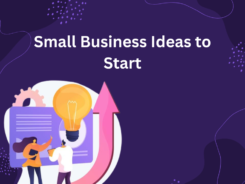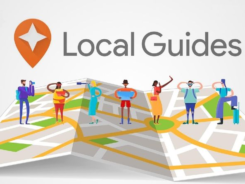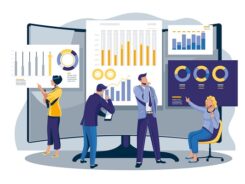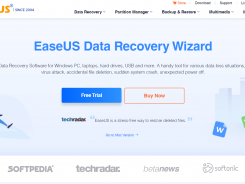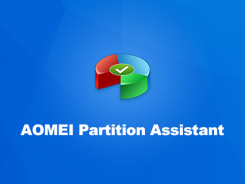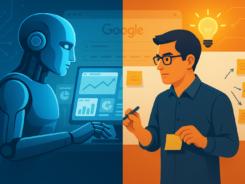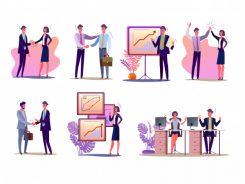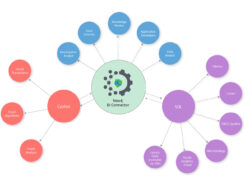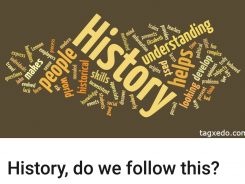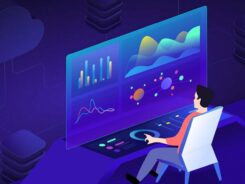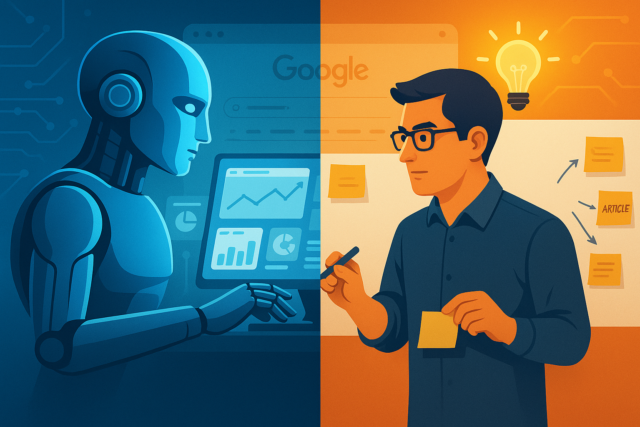How AI-driven tools impact search rankings, content creation, and user experience—and where the human touch still reigns supreme.
AI has revolutionized nearly every aspect of marketing, and SEO is no exception.
While AI-driven tools are optimizing workflows and uncovering insights at scale, the question remains—can automation truly replace human expertise in SEO strategy and execution?
The rise of AI tools like ChatGPT, SurferSEO, and Clearscope has changed the way SEO professionals work—but can algorithms really understand user intent the way humans do?
How AI Is Transforming SEO
- AI in Search Ranking Analysis
- SERP tracking at scale
- Predictive algorithms (example: Google’s AI-based ranking systems like RankBrain, BERT, and now Gemini)
- How tools use AI to interpret trends, competition, keyword opportunities
- AI in Content Creation
- Automated writing tools like Jasper, ChatGPT, KoalaWriter
- Pros: Speed, scale, initial drafts
- Cons: Lacks depth, voice, nuance, E-E-A-T
- AI and User Experience (UX)
- AI-enhanced personalization (recommendation engines, heatmaps, A/B testing)
- SEO implications of UX signals: dwell time, CTR, bounce rate
- AI tools for UX insights (Hotjar, Crazy Egg, GA4 with predictive modeling)
Where AI Falls Short
- Strategy and intuition
- Brand voice and emotional intelligence
- E-E-A-T compliance and trust-building
- Penalties for over-optimization or “AI content spam”
- Examples of where AI misfired in SEO execution
Expert Opinions
By Iurii Nemtcev, SEO Expert, CEO at Big Lab Digital Agency
Artificial intelligence is transforming SEO in ways we couldn’t have imagined a few years ago. It’s helping us analyze search trends faster, automate technical optimizations, and even generate content. But does that mean AI can fully replace human expertise? Absolutely not.
SEO has always been more than just algorithms and rankings. It’s about understanding people—how they search, what they need, and how to give them the best possible experience. AI can assist with this process, but it lacks the strategic thinking, creativity, and deep industry knowledge that make SEO truly effective.
- Where AI Makes a Difference in SEO
AI is a game-changer when it comes to handling massive amounts of data. Tools powered by machine learning help us quickly identify what’s working and what’s not. Google itself uses AI-driven algorithms like RankBrain and MUM to understand user intent better, which means SEO today is less about keywords and more about context.
Technical SEO has also benefited from AI automation. We can now audit websites in minutes, detect duplicate content, optimize internal linking, and even generate structured data automatically. AI-powered chatbots are improving user engagement, and predictive analytics help us anticipate trends before they peak.
And then there’s AI-generated content. It’s great for speeding up workflows, but let’s be honest—it often lacks depth, originality, and nuance. Google’s EEAT (Experience, Expertise, Authoritativeness, Trustworthiness) principles are clear: real expertise matters. AI can generate a rough draft, but without human input, it risks being generic and uninspiring. - AI + Human Strategy
The best SEO strategies today don’t rely solely on AI, nor do they ignore it. The real winners are those who use AI for automation while keeping the human touch where it matters. AI should handle repetitive tasks, analyze patterns, and provide insights, but people still need to make strategic decisions, craft engaging content, and optimize for real user needs—not just algorithms.
A big shift is coming with Google’s Search Generative Experience (SGE), where AI-generated answers will play a larger role in search results. That means SEO is evolving again, and businesses need to focus on content that is genuinely valuable, authoritative, and engaging—not just optimized for AI.
BY Sheraz Ali, the director of HARO Links Builder
In innovative marketing strategies. I have witnessed the revolutionary shift AI is initiating in search engine optimization. AI is not taking away human SEO skills – it’s becoming a force multiplier of strategic human intelligence. Search algorithms are increasingly sophisticated, requiring a high-level integration of technological tools and innovative human creativity to excel.
My experience with AI-powered SEO tools is that they can speed up content research, keyword analysis, and optimization tasks. I’ve witnessed AI identify content gaps, propose semantic enhancements, and even forecast probable ranking opportunities with high accuracy. The magic ingredient remains with human strategic interpretation and creative content creation.
Based on my own experience of collaborating with different brands in different industries, I’ve always believed that AI is best utilized as a team player. It can generate rough drafts of copy, perform sophisticated data analysis, and provide optimization recommendations – but the final strategic direction, unique point of view, and actual voice require human intelligence.
For example, while developing content strategy for a tech startup last year, AI tools enabled us to build keyword clusters and competitive content maps in just a few seconds. But it was our domain expertise and storytelling skills that gave those insights life in actual content that worked well for search algorithms and readers alike.The future of SEO is not man vs. machine – it’s the union of AI and man to create smarter, more responsive, and more valuable digital experiences.
Hilary Torn, CEO and Co-Founder, Pixlie
AI is revolutionizing search, but does it replace human expertise or complement it? Share your thoughts on the best practices for balancing AI-driven automation with traditional SEO strategies!
AI is revolutionizing everything, including Search Engine Optimization. How SEO works now, AI is a powerful tool that compliments human expertise. Content writers are able to write great content even faster than before. Throwing in some prompts and having a completed article ready to post on your website will never cut it. It still takes the human expertise to understand how useful this article is, how it stacks up against competition, and how it will help current customers is not going to be replaced anytime soon.
I think as AI hallucinations are lowered with more accurate data collection like knowledge graph will make AI even more powerful to SEO specialists. Being able to throw in competitor backlinks and compare them to current backlinks you have, pulling out the ones that are most useful that you could potentially get yourself will save a lot of time compared to doing this manually.
This is what Pixlie is aiming to do, provide more accurate insights by using knowledge graphs in AI instead of vector databases. So as AI becomes more reliable, it will become a more useful tool.
All this being said, I do also think AI will fundamentally change how we search. Before AI, Google was the go to search engine. However, this is already starting to transform.
One, people are sick of the ads. It is harder and hard to find what you are looking for via google. Secondly, people are already searching via LLM models like ChatGPT and Claude, bypassing the traditional search results. For those who want a more traditional search result, AI searches like Perplexity will become more the norm.
Lastly, I think privacy is going to become more and more important. Which is why we are building Pixlie – not only will it be able to analyze data inputted accurately, but it is completely private, run on your machine, not in some cloud. I’m already finding myself using Pixlie for large searches. Like when I want to look for grants we can apply for, instead of going through each search result, I can collect them all in Pixlie, tell the AI which ones are accurate, which ones are not, and keep the search going. It’s a great tool for monitoring changes and getting updates on public web content.
Deepak Shukla, CEO at Pearl Lemon
The rise of AI in SEO has definitely sparked interesting conversations, and while it’s clear that AI tools are transforming how we approach search rankings, content creation, and user experience, they aren’t necessarily replacing human expertise. And that’s why I am reachin out on behalf of Deepak Shukla, The Hubspot Certified SEO Exepert and the CEO of Pearl Lemon. What he had to say –
Keyword research, content analysis, and performance tracking are just a few of the repetitive, data-intensive tasks that AI excels at automating. Marketers can make data-driven decisions more quickly with the aid of tools like automated SEO audits and AI-driven content generators. Nonetheless, human knowledge is still essential, particularly in the areas of strategy, creativity, and comprehending the complex requirements of a target market.
When AI and traditional SEO strategies are balanced, AI takes care of the labor-intensive tasks, such as trend analysis and the creation of preliminary content drafts, while human insight is used to adjust and improve strategies in response to shifting consumer behavior or market conditions. In the end, SEO is not just about optimizing for algorithms; it is also about comprehending user intent and creating interesting content.
Businesses that want to succeed in the digital sphere must build a strong synergy between AI and human expertise rather than prioritizing AI over human knowledge. Pearl Lemon stays ahead of the curve by utilizing AI tools to improve our work while maintaining a strategic human touch.
Hanna Borukha, Project and Operations Manager at SEO Spokane
AI has sped things up, no doubt. We use it for drafts, audits, and clustering — it saves time. But SEO is still strategy first. You need someone who can read between the lines of the data, understand user behavior, and align content with actual business goals. That doesn’t come from an algorithm.
I’ve seen AI-generated pages pull traffic that looks great on paper, then tank conversions. Why? Because it missed the intent. No AI can replace the hands-on work of adapting SEO to real market shifts or client-specific needs. It’s a tool, not a decision-maker.
Good SEO blends instinct with insight. And instinct only comes from doing the work, learning from wins and failures, and staying sharp — not just fast.
Kalim Khan, Founder at Affinity Law
AI has transformed SEO by streamlining processes like keyword research, content optimization, and predictive analytics. However, while AI enhances efficiency, it does not replace the strategic thinking, creativity, and human intuition required for long-term SEO success.
- AI as a Powerful SEO Tool, Not a Replacement
AI-driven tools have significantly improved search rankings by automating tasks like keyword clustering, intent analysis, and content structuring. Platforms like ChatGPT, Surfer SEO, and Clearscope assist in optimizing content for search engines by analyzing vast amounts of data instantly. However, AI still lacks the ability to fully understand user emotions, brand tone, and evolving search behaviors—areas where human expertise remains irreplaceable. - Balancing Automation with Strategic SEO
The best approach to SEO involves leveraging AI for data-driven insights while maintaining human oversight for content strategy and user experience. AI can efficiently generate content, but human intervention ensures quality, relevance, and compliance with search intent. Moreover, aspects like E-E-A-T (Experience, Expertise, Authoritativeness, and Trustworthiness), link-building strategies, and audience engagement require a level of human understanding that AI cannot replicate. - The Future of AI and SEO Collaboration
Rather than viewing AI as a replacement, businesses should integrate it as a collaborative tool. AI enhances efficiency and analytics, but human expertise remains vital for personalization, brand storytelling, and adapting to algorithm shifts. Companies that find the right balance between automation and human-driven SEO strategy will ultimately achieve sustainable growth in search rankings.
Ihor Shulezhko, founder of IhorShoo SEO agency
Last quarter, we ran an experiment. Our team generated two identical articles: one purely AI-written, and another AI-drafted but human-refined. The human-refined piece outranked the pure AI content by 47% in Google search results. That’s not a coincidence; that’s strategy.
AI isn’t a magic wand that replaces human expertise — it’s more like a turbocharged assistant. Think of it as a powerful calculator for a mathematician. The tool helps, but strategy and creativity are 100% human-driven.
From my experience, AI generates content fast, but it lacks the soul that connects with real readers. Search engines are getting smarter at detecting cookie-cutter AI content. They want authentic, thoughtful pieces that solve actual user problems.
The secret sauce? Blend AI efficiency with human intuition. AI helps with data analysis, keyword research, and initial drafts. But human experts bring context, emotional intelligence, and strategic vision that no algorithm can replicate.
Manou Maudgal, Founder of Growthforcedigital
AI is definitely a game changer regarding SEO and Search. However, it does not replace human skills, tactics and know-how but works complementary. We treat AI as good “junior” SEO consultant which can automate tasks and develop case specific tactics. This means that human and “senior” SEO intervention is needed to implement quality search optimizations. Hence, the major advantage of using SEO is that we are able to reduce working time regarding SEO tasks
Best Practices for:
- On Page SEO: We use AI in a supportive way to create our content. Giving a few prompts and expecting a fully automated SEO optimized article that will perform well in search is not the way to go. Instead, we use it to optimize the structure of the content, do the research and writing ourselves and then revise it by AI to correct grammar and spelling mistakes. ChatGPT does a great job in assisting in the content creation process. However, proper keyword research should still be done by a human SEO specialist since it requires tools like SEMrush, Ahrefs or Surfer SEO to get the best results.
- Technical SEO: Also for the technical SEO optimizations AI can do a great job. For instance adding schema markup code to your website or webpages. Even if you don’t know how to write code, AI can do this for you in a matter of seconds. However, manual checks need to be done to make sure the markup code is valid and correct.
- Link building: ChatGPT can give you a list of domains that are relevant for you niche which sometimes can be good but often lacks in-depth and case specific insights. Tools like SEMrush for instance let’s you analyse your main competitors backlink profile and give insights were the gaps are along with the link power their backlinks. This is something that ChatGPT can not provide. Hence, AI is probably the least useful for linkbuilding purposes in our opinion.
Oliver Morissey, founder of Empower Wills and Estate Lawyers
While I’m not an SEO expert, I’ve seen firsthand how AI-driven tools are shaping digital marketing, especially in terms of content creation and search rankings. In our firm, we’ve adopted some AI tools to help streamline our online presence, but we still rely heavily on human expertise to ensure that our content resonates with the right audience.
AI has definitely transformed SEO, but it doesn’t replace the need for human strategy. For example, AI can help generate keyword-rich content and optimize headlines for SEO purposes, but it doesn’t understand the nuances of human intent or emotions the way a skilled writer can. AI might be able to tell you which keywords are trending, but it’s still human expertise that shapes the narrative and ensures content is engaging. A recent study showed that pages optimized with AI tools saw an average of 18.6% more traffic, but those with human-driven content, particularly around user intent, were far more likely to convert.
The key is finding the right balance between automation and traditional SEO strategies. AI can handle the heavy lifting—like analyzing large data sets, improving page speed, or generating reports—while human experts focus on refining content, making strategic decisions, and adapting to evolving search algorithms. This collaboration results in more effective, sustainable SEO practices.
If you’re looking to navigate the changing SEO landscape or need advice on how to integrate AI into your strategy, feel free to reach out. I’d be happy to discuss how we’ve combined automation with human expertise to improve our online visibility.
Agata Gruszka-Kierczak, International SEO Manager at WhitePress
The reality is that ignoring AI tools while working in SEO is like trying to eat soup with a fork. You’ll miss the full potential of your meal—and the same goes for your search results. Especially with AI-powered search engines becoming the standard, you have to optimize for AI. And who better to help you do that than AI itself?
Generative AI is a powerhouse for content creation—that’s where most SEOs are diving in, and also where most of the controversy lives. If you’re active in the SEO community on LinkedIn, you probably see daily case studies about websites built with AI tools and packed with AI-generated content. But did you hear about them later? Probably not. Most of them lose their organic traffic even faster than they gained it.
Throwing AI-generated content at the wall might get you quick wins, but don’t expect it to last. LLMs evolve constantly, and what’s considered ‘good’ content today might be ‘garbage’ tomorrow.
That’s where the human element comes in. Think of AI as an amplifier for your skills—not a replacement. It can crunch data, suggest keywords, even draft content. But it can’t replicate human creativity, judgment, or common sense. That human supervision? That’s what makes your content future-proof.
Zuhura Miriam, PR Manager at The Nova Global
AI will never replace human expertise. It can only enhance it. Think of it as one of those learned friends with experience who you can learn from, but they still get to learn from you.
Regarding customer experience, automated responses are a turn-off if not complemented with a human touch. Trigger someone into your sales funnel if it is straightforward, but ensure it is laced with human interaction so the person feels that they belong. Remember, not everyone asks FAQs. And when they do, the follow-up question might be something not in the automated response.
Using AI for SEO, keyword research, or content creation is great, but that should not stop there. You need an expert to know how to hit the balance, ensure that it is a match, every output is accurate, and with a human touch. Ultimately, you don’t want to come out as quoting one’s thesis paper and riding on it as your expert output, trying to build authority around your brand. You also need a human expert to give proper prompts for great responses. When one has no idea what to expect, they will ride on something like ” top ranking SEO keywords,” while the expert would have defined their brand, their audience, and the expected output within the prompt for better and accurate results. Once you get the keywords, you need an expert to know how best to place them in the content and which words to run with. Just because it is highly ranked doesn’t mean it’s the best for you.
Meyr Aviv and I am the Founder & CEO of iMoving
“AI is a game-changer in SEO, but let’s not pretend it can run the show on its own. It’s an assistant, not a strategist!”
At iMoving, we use AI for data-driven insights—suggesting keywords using keyword planner, analyzing moving trends, and automating reports—but it still needs human direction to create compelling content and strategic SEO tactics.
Without guidance, AI spits out generic, soulless content that fails to engage or rank. The key is to use AI as a tool, not your replacement—leveraging automation for efficiency while keeping human expertise at the core. The brands that strike this balance will dominate search rankings. Happy to share more insights!
Mike Khorev – Growth Marketing Consultant at Mike Khorev
AI is reshaping SEO, but it doesn’t replace human expertise. It speeds up data analysis, content creation, and trend prediction. However, relying solely on automation leads to generic, low-value content that fails to engage users.
The key is balance. AI should handle repetitive tasks—like keyword research and performance tracking—while humans refine strategy, storytelling, and user intent. Search engines favor content that provides real value, not just AI-generated fluff.
One best practice is using AI for insights but keeping content creation and link-building human-led. For example, a client saw rankings drop after flooding their site with AI-written blogs. After shifting to expert-driven articles supported by AI research, engagement and rankings improved.
AI is a tool, not a strategy. It helps, but human judgment remains critical. The best SEO approach blends automation with expertise, ensuring content stays relevant, engaging, and aligned with search intent.
Andrew Lokenauth, Founder at TheFinanceNewsletter
I’ve spent years implementing SEO strategies, and I’ll tell you straight up – AI isn’t replacing human expertise. It’s making us better at what we do. Last month, I used AI to analyze thousands of keywords in minutes (something that would’ve taken days manually). But here’s the thing – I still needed to make strategic decisions about which keywords actually mattered for my client’s goals.
The real power comes from combining AI capabilities with human insight. When I’m working on content strategy, I use AI tools to gather data and identify patterns, but I rely on my experience to understand user intent and create content that resonates. Back in September, I worked with a fitness brand where AI suggested targeting “workout routines,” but my market knowledge told me their audience specifically wanted “15-minute home workouts for beginners” – that insight tripled their conversion rate.
- Best Practices for Integrating AI into SEO Strategy
From my extensive testing, I’ve found that letting AI handle the time-consuming tasks works best. Think data analysis, technical audits, & content optimization suggestions. But I always maintain human oversight for strategy and decision-making.
One approach that’s worked incredibly well for me involves using AI for initial keyword research and content ideas, then applying human creativity and expertise to craft unique angles. In fact, I increased a client’s organic traffic by 225% using this exact method. - The Future of SEO with AI Integration
Based on what I’m seeing in the industry, AI will become more sophisticated in understanding search intent and content quality. But it won’t replace the need for human creativity and strategic thinking. I’ve noticed AI tools sometimes miss nuanced cultural references or fail to grasp subtle brand positioning – things that experienced SEO professionals catch immediately.
The sweet spot I’ve found is using AI for about 40% of the technical SEO work while keeping human experts in charge of strategy, relationship building, and creative direction. This combination has consistently delivered the best results for my clients.
And listen – I’ve made mistakes along the way. Early on, I relied too heavily on AI-generated content recommendations without adding my own expertise. The content felt generic and didn’t perform well. Now I know better – AI is a powerful tool, but it needs human guidance to truly shine.
The thing is, successful SEO today isn’t about choosing between AI or human expertise – it’s about leveraging both effectively. I’ve seen firsthand how this hybrid approach leads to better rankings, more engaged users, and stronger ROI.
Luca Dal Zott, Founder of Convert Bank Statement
I’ve had more than a decade of experience creating and selling companies. This has provided me with a front-row seat to the constantly changing world of online presence and SEO. I’ve learned the hard way how important it is to keep up with new technologies, and AI is undoubtedly one of the largest game-changers we’ve experienced.
AI is revolutionizing SEO, yet it effectively complements human expertise and not a replacement. The hypothesis that AI might fully replace SEO is, according to me, a myth. Although AI has immense strength when it comes to automation and statistical analysis, SEO’s strategic and creative dimensions fall squarely in human hands.
I’ve witnessed AI-powered tools transform many of the fundamental elements of SEO. For example, I’ve utilized AI to scan massive data sets to rapidly determine keyword trends so that we can make data-driven decisions about content strategy. I’ve also witnessed how AI can handle mundane tasks, such as technical SEO audits, so my team can concentrate on more strategic tasks. And let’s not forget that Google itself heavily leverages AI in its ranking algorithms, so it’s vital that we SEO practitioners follow suit.
But, simultaneously, I’ve learned that SEO is not just about algorithms and data. It’s about connecting with human intent, building fantastic content that resonates with people, and building authentic brand experiences. This cannot be done by AI. It takes an advanced understanding of human psychology, cultural sensitivities, and the art of storytelling.
Take content creation, for instance. I’ve watched AI generate content, but it always lacks the same creativity, emotional resonance, and singular perspective that makes the best, most compelling content. Based on my experience, mixing human-created content with AI-boosted tools has resulted in far greater success than AI-generated content alone. What I’ve discovered is that it’s the human touch that resonates with people.
Besides this, SEO is all about trust and relationships. AI can never create genuine relationships with the audience or develop a brand voice that builds loyalty. We, human SEO professionals, understand the audience, build relationships with influencers, and create the overall brand strategy.
In short, the best practice is to embrace AI as a valuable tool to complement, rather than replace, human capabilities in SEO. AI can automate tasks, provide meaningful data analysis, and boost productivity. But the strategic mind, creative content creation, and human touch required for long-term SEO success are ours to keep. An integrated approach is the path to success in the evolving search environment.
Duman Zhumagulov, Co-Owner at Boxstar Movers
I think the biggest misconception right now is that AI can fully replace human SEO experts. It can’t.
I use AI every day—from analyzing keywords to generating draft content—but I’ve learned that without human judgment, strategy, and creativity, AI ends up producing flat results.
What I do is use AI as a time-saving co-pilot. I’ll have it do the heavy lifting on data—like analyzing SERP trends, finding gaps, or even helping brainstorm outlines. But I never publish anything without adding my personal experience, insight, or tone.
Google’s algorithms are smart enough now to pick up on real value, and that’s still human-driven.
One of the best practices I’ve adopted is combining AI content generation with feedback loops—meaning I look at performance data and keep refining based on what works.
I also make sure the voice of my brand stays consistent, which AI can’t always handle well without guidance.
AI has changed the game, no doubt—but I think it’s made good SEO professionals even better. It’s not either/or. It’s both—automation plus intention.
Amit Raj, the CEO of a bespoke link-building
Link building is one of the fundamental aspects of SEO, and AI has also made itself known in this sector of SEO.
There have been a lot of benefits to adding AI into our processes. From automating tasks to optimizing our efforts. We have used it for many aspects of our operations.
That being said, we still understand the importance of creating content that is relevant and in-depth. We represent an array of clients, and it requires us to put our best foot forward at all times. These tools have helped us do so from an operational perspective. When we create content, we aim to focus on what aligns with the audience and our clients rather than just getting the job done for the sake of it.
The way in which these tools have helped us is by helping us identify untapped opportunities and find context where we are unable to make the connection. This has been beneficial from the prospecting stages right up to the creation of the content that we are putting out. Human oversight is integral to our work as it ensures that we still share authentic and credible expertise and showcase creativity in our efforts.
Dallas McLaughlin, Owner at Dallas McLaughlin
AI is revolutionizing search, but does it replace human expertise or complement it? Share your thoughts on the best practices for balancing AI-driven automation with traditional SEO strategies!
“In my experience, AI has become an incredibly powerful tool for streamlining technical SEO tasks that once required a team of specialists—things like generating schema markup, clustering keywords into thematic silos, analyzing SERP trends, and even drafting structured meta content. That said, AI is a complement, not a replacement. Human strategists are still essential for understanding audience intent, setting priorities, and making judgment calls that align SEO efforts with broader business goals. The real magic happens when experienced marketers use AI to accelerate execution, freeing up time and brainpower for higher-level strategy and creative direction.”
AI is transforming SEO, but it’s not replacing human expertise anytime soon.
Chris Bolton, SEO Consultant at Diviner
AI is transforming SEO, but it’s not replacing human expertise anytime soon.
- The Bad:
AI Tools that blast out generic content are rapidly polluting the internet. It’s SEO spam basically. But it’s not super effective, and hopefully SEOs will learn that AI should be a partner not a replacement. - The Good
AI tools are enabling SEOs to do research and analysis quicker and therefore free up more time for strategy and implementation. AI is also making authentic voices and unique perspectives more important as people are tiring of regurgitated advice created by AI.
AI-driven search (Google’s AI Answers, ChatGPT, Perplexity, and now Claude) are changing how content gets surfaced, summarized, and interpreted. So now, good SEO is much less about keywords, it’s about making sure your content is understood and re-used by AI in a way that reflects your brand and value.
Soumya Mahapatra, CEO of Essenvia
Ultimately, AI is just a tool. While automation can make your SEO operation faster and more efficient, human input is still essential. Take tracking keyword performance as an example. AI is great at this. It’s quick and can even take action based on pre-set thresholds of keyword ranking. Human experts still have to pick the keywords to focus on, set those thresholds, and decide how to change approaches if a particular keyword is underperforming.
Hugh Dixon, Marketing Manager at PSS International Removals
I’ve seen how technology is changing the game, especially in SEO. AI tools can automate a lot of tasks, like keyword analysis, content optimization, and even some aspects of content creation. These tools can certainly help streamline processes and make SEO efforts more efficient. However, they don’t replace the need for human expertise.
AI can suggest keywords and generate content quickly, but it lacks the nuance and understanding that comes from a real person. For example, I’ve used AI tools to help identify which search terms we should target, but when it comes to crafting messaging that truly resonates with expats and people relocating, it’s still a human touch that makes all the difference. At PSS, we’re dealing with sensitive, emotional topics, like people’s lives changing as they move overseas, and understanding how to speak to those feelings requires human insight.
In my experience, AI should be seen as a tool to enhance human efforts rather than replace them. For instance, AI might help us analyse how users interact with our website, but it’s the human perspective that allows us to take that data and translate it into meaningful changes that improve the user experience. So, while AI is an incredible asset, human expertise is still essential for making those final, strategic decisions.
Ashwin Ramesh, CEO of Synup
Having worked with several startups, with a focus on SEO practices, I can say that AI is something that is revolutionary and has been a long time coming. With my current venture, Synup, we leverage AI to enhance local SEO strategies, in particular, through predictive analytics and grid ranking technology. While many are still apprehensive to use them, they can help businesses understand the different ways customer discover their services and allow businesses to optimize content to help drive engagement levels and conversion rates.
Businesses do not have to fear implementing AI into their operations, especially for SEO, as it complements human expertise at this stage. It can aid the process of creating more authentic content. It can help create a synergy that is both data-driven and impactful.
Dario Markovic, CEO of Eric Javits
AI is revolutionizing SEO by enhancing automation, streamlining data analysis, and optimizing content at scale. However, it does not replace human expertise—it complements it. AI-driven tools are excellent for tasks like keyword research, content suggestions, and search intent analysis, but they lack the strategic thinking, creativity, and brand storytelling that make content truly valuable. The best SEO approach is a hybrid model: leveraging AI for efficiency while relying on human expertise to ensure content quality, brand authenticity, and adherence to Google’s E-E-A-T (Experience, Expertise, Authoritativeness, Trustworthiness) principles. Brands that balance AI automation with human oversight will gain a competitive edge in the evolving search landscape.
Natalia Szubrycht, Marketing & AI Specialist, KlikLekarz
AI is transforming SEO by automating data analysis, optimizing content at scale, and enhancing user experience through personalization. However, while AI significantly improves efficiency, it doesn’t replace human expertise—it complements it.
Search algorithms are increasingly driven by AI, meaning marketers must adapt to AI-driven ranking factors like user intent, content relevance, and engagement signals. AI-powered tools can help identify keyword opportunities, analyze SERP trends, and even generate content drafts. However, human oversight is crucial to ensure content quality, brand voice, and strategic alignment with business goals.
The best approach to balancing AI with traditional SEO strategies is to use AI for data-driven insights while keeping content creation, strategy, and audience engagement human-centric. AI can assist in automating repetitive tasks such as meta-tag generation, internal linking, and performance tracking, allowing SEO professionals to focus on high-level strategy and creativity.
Ultimately, AI is a powerful tool, but it works best when paired with human expertise. The key is to leverage AI for efficiency and insights while maintaining the human touch that makes content valuable, engaging, and authoritative.
Edward Tian, and I am the CEO of GPTZero
AI is undoubtedly impacting SEO, and for websites, it causes more problems than it does provide a boost. You can’t submit any Google search anymore without an AI Overview popping up at the top of the results, giving you answers. That’s making it so much harder for websites, especially smaller ones, to get seen and promoted at the top. So, businesses do need to adjust their SEO strategies to this new normal. For example, keywords are more essential than ever here for showing up with relevant searches. Unique content is also invaluable. When content is generic in nature, that can make it rank lower since it can seem more obviously generated by AI. So, having content that is niche and uniquely valuable can make a big difference.
Ace Zhuo, CEO at TradingFXVPS
Balancing AI-powered automation with conventional SEO methods is about achieving synergy between innovation and proven techniques. AI tools can streamline processes by interpreting data and forecasting patterns, but depending solely on automation often misses the personal touch needed to resonate with your audience. Core SEO practices, like crafting compelling, valuable content and fostering authentic backlinks, remain critical for sustained growth. In my experience, combining these strategies delivers the best results—leveraging AI to simplify analysis while dedicating human effort to creating genuine, audience-driven material. For instance, I use AI for identifying keyword opportunities but ensure the final output embodies my tone and knowledge. This blend not only boosts productivity but also fosters trust and engagement with my audience. By thoughtfully integrating technology with a human-centric approach, you can remain competitive without sacrificing authenticity.
Justin Tardif-Francoeur, Co-Founder of Montreal Weights
I use AI for data analysis, content optimization, and automation, but human insight is still key for strategy, creativity, and trust-building. The best approach is balance: I leverage AI for keyword research, trend analysis, and technical SEO while ensuring content remains user-focused and authoritative. Google’s evolving algorithms prioritize expertise and originality, so I refine AI-generated insights with real-world experience. The key is using AI as a tool, not a crutch.
Dario Srsen, Editor-in-Chief and Content Operations Manager at Filmopedija
AI is absolutely transforming SEO! But it’s important to understand that rather than replacing human expertise, it’s best viewed as a powerful complement to it. At Filmopedija.com, we use AI to analyze search trends and identify emerging topics in the film industry. We even use it to generate initial content drafts or metadata suggestions. It speeds up the process. But the final layer of creativity and decision making always comes from a human editor.
The best SEO strategies today are hybrid: use AI to surface insights, automate repetitive tasks, and streamline workflows. But in doing that, you always need to rely on human expertise to shape the narrative, match the tone of your company, and of course, understand the context. Especially for E-E-A-T (Experience, Expertise, Authoritativeness, and Trustworthiness) signals.
For example, AI might help identify that there’s a spike in search around a specific film genre, or an actor. But only a human can decide how to turn that into a compelling article. Into something that resonates with readers and performs well long-term.
The key with AI is knowing where to draw the line. Automation is great for scale, but when it comes to storytelling, brand voice, and SEO strategy, the human element is irreplaceable. If you use AI for that too, your audience will know it, and Google will know it too. And that won’t work well for you.
Firdaus Syazwani, Founder of Dollar Bureau
As a seasoned entrepreneur and founder of multiple online ventures, I have navigated the evolving landscape of SEO, constantly integrating AI tools to enhance our strategies without overshadowing human creativity.
AI-driven tools have indeed revolutionized SEO by automating mundane tasks and analyzing data at scale, which is vital for optimizing search rankings and content relevance. However, they complement rather than replace human expertise. Strategic SEO still requires a deep understanding of market trends, consumer behavior, and the ability to craft content that resonates on a human level.
In my experience, balancing AI-driven automation with traditional SEO involves leveraging AI for data-driven insights and efficiency, while employing human creativity to develop unique content strategies that engage and convert. For instance, at my company, we use AI for keyword research and initial content drafts but refine the final output manually to ensure it aligns with our brand voice and audience expectations.
It’s crucial to maintain this balance to not only achieve high search rankings but also to create an authentic user experience that fosters brand loyalty and conversion. This approach has allowed us to consistently generate significant monthly revenues through sophisticated, yet practical, online marketing strategies.
Rosie Williams, Independent SEO Consultant
AI is such a buzz-word but we are a long way off AI replacing human expertise. When it comes to content-creation, there is a stark difference between AI-generated and human-generated content. Google can spot it a mile off for a start – why would it rank your AI-generated answer over its own AI-generated answer? Will Google want to reference your AI-generated answer as the trusted source on their AI overviews? No.
AI can absolutely complement human expertise – it’s been a game changer for creating a structure or an outline for a piece of content. But the real value in a piece of content is the extra touches; the nuggets of data not found elsewhere, the relatable tone of voice, the anecdotal references, the opinion pieces. This is what people want to read and this is what will rank higher in the end.
AI is only as good as the information it finds online, so is a piece of AI-generated content really adding any value? Every good SEO knows that each piece of content you create needs to add value to what’s already out there on the topic. Google has also made it clear that they’re looking for added value, not just a regurgitation of the internet. Humans are best placed to do this….for now.
Mihajlo Krstic, Owner of Aeternus
Recently, we noticed a prevalence of AI being used for SEO and content creation. While using various AI tools in content creation or search engine optimization processes is okay, over-reliance on them can lead to potential pitfalls that non-experts can easily overlook.
People overlook these pitfalls because of the fundamentals of SEO. Search engines operate like libraries at their core – they index publicly available information and present it to a query based on relevance. If you want your content to be relevant to a query, you have to know what your audience wants. Academic writing is closer to SEO writing because of the reliance on keywords, so following academic writing principles can give you a competitive edge.
Experts at Aeternus use AI tools to complement their work and speed up some processes. They approach prompting AIs by keeping in mind the audience that’s going to see the content. Of course, there’s a learning curve to how AI prompting works, but experts need to overlook the whole process. Regarding regular content creation, here’s a process breakdown we use internally and with some of our clients.
- We start by discussing the audience we’re addressing with this content. We rely on a solid, tested customer persona at the start of this process.
- Depending on where a particular customer group is in their buying process, we brainstorm topics that address a concern or provide new information.
- After we find the topics that (a) address a concern, and (b) are reasonably sure the target audience will find helpful, we feed these topics to an AI tool. Content/copy experts refine the prompt to find different angles, adjust formulas, and find an acceptable way to present the topic.
- After the first draft is completed, editors review the proposed draft and provide feedback.
- The content goes back to the expert who made it for further refinement, until we get it just right.
- Once the content is acceptable, we take it offline, refine it further, add brand guidelines, and have one last review by the editors.
As you can see, we never take AI’s output at face value. Experts in their craft and our target businesses must oversee the whole process. This process allowed us to rank our case studies at the top of various search engines for several different keywords, overtaking Forbes, FT, or even brands we cover in our articles.
(For example, that’s how we got our case study on “BYD marketing strategy” to rank #1 in the US).
Burak Özdemir, Founder of Morse Code Translator
AI is transforming SEO but does not eliminate the need for human expertise. Instead, it enhances efficiency in data-heavy tasks while requiring human judgment for strategy and creativity.
AI-powered tools like BrightEdge, MarketMuse, and Clearscope analyze search behavior faster than manual methods. According to HubSpot (2023), around 55% of marketers using AI for SEO report improved rankings within three months. AI can process over 1,000 ranking factors in minutes, a task that might take 10 or more hours for a human analyst. However, AI cannot fully understand context, so human oversight is necessary to ensure keyword choices align with brand goals and user intent.
In content creation, AI speeds up drafting but still requires human refinement. About 42% of businesses using AI for content see a 20-30% reduction in production time, per SEMrush (2023). However, Google’s algorithms increasingly prioritize expertise and trustworthiness, meaning purely AI-generated content risks penalties if not properly reviewed.
For user experience, AI improves efficiency through dynamic meta tags (which can increase click-through rates by 5-15%) and chatbots that handle 68% of queries before human assistance is needed, as reported by Drift (2023). Yet, AI cannot fully replicate human empathy, especially in industries requiring sensitivity or careful handling.
The most effective SEO strategies combine AI’s analytical speed with human expertise. AI excels at repetitive tasks like data sorting and trend detection, while humans should guide strategy, interpret insights, and ensure content meets quality standards. According to BrightEdge (2024), only 23% of businesses fully trust AI-driven SEO without human verification.
AI may automate 40-50% of routine SEO tasks, allowing professionals to focus on creative and strategic work. The key is balance—using AI as a tool rather than a replacement.
Liam Perkins, Digital Marketing Manager at Privr
AI is a game-changer for scaling the mechanics of SEO – think keyword clustering, predictive analytics, or spotting SERP trends faster than any human could. But AI can’t replicate the human intuition needed to craft stories that resonate with marginalized communities (like LGBTQ, our target group at Privr). For example, optimizing for “privacy-focused dating” isn’t just about metadata—it’s about understanding the real anxiety LGBTQ+ users feel around data leaks, which requires lived experience and empathy.
The sweet spot is to let AI handle the grunt work (like A/B testing headlines or automating local SEO), but keep humans in the driver’s seat for strategy and tone. AI can’t sniff out cultural nuance or build trust through authenticity, especially in niche spaces like LGBTQ. So yeah, automate the what, but never outsource the why.
AI is the copilot, not the captain. It’s a clutch for efficiency, but human expertise is what turns rankings into relationships. Without that balance, you’re just gaming algorithms, not building communities.
Scott Gabdullin, CEO of Learo
While AI has changed SEO, it’s not a substitute for human expertise. It streamlines things like keyword research, content optimization, and performance tracking to help you keep up with SEO. AI, for example, is capable of rapidly identifying trends and making recommendations for change, but lacks the nuance and understanding of context or audience that only humans can provide. Human insight is still required for the final call on strategy and content. Using AI for all of the boring stuff and leaving the creative and strategic side to humans is the best way to go. So, try to keep it as balanced as possible, in order to achieve the best results.
Scott Gabdullin, Founder of Authority Factors
AI certainly changed the way we do SEO, but I wouldn’t say it removes the need for a human touch. In my experience, AI can drastically speed up some of the work processes that are repetitive in nature, such as doing keyword research or analyzing trends, but it cannot produce the creativity or intuition that only a human being could bring. AI is good with analytics — like tracking which keywords are likely to be most effective — but you cannot automate the human touch that is needed to create content that resonates. It’s important to use AI to take over those more mundane tasks so we can spend more of our time on strategy and the big picture. It’s about finding that sweet spot where automation helps, but doesn’t take over the parts of SEO that require a personal touch.
Seann Malloy, Managing Partner and lead Personal Injury Attorney at Malloy Law Offices
AI is transforming search optimization and law firm marketing, but it’s not here to replace us—it’s a strategic tool in our toolkit. Rather than just changing how people work, it serves as a valuable collaborator.
We’ve observed that AI was initially championed by Google. Today, Google encourages content creators to use AI tools judiciously. Based on our experience, while AI helps us generate content more efficiently, human input remains essential for true optimization—whether in SEO, content production, or even video creation. Purely AI-generated content often lacks depth and personality, and search algorithms increasingly prioritize the E-E-A-T standard (Experience, Expertise, Authoritativeness, Trustworthiness). That’s why we always manually refine and localize content, ensuring it not only answers queries but also reflects our hands-on expertise in Maryland, Virginia, and the DC area. Below are some real-world examples from our work:
As a personal injury law firm, we frequently share insights tied to current events or notable cases. To enhance efficiency, we begin by using AI to generate article outlines and draft content. However, our marketing team and attorneys always refine the details—adding real case examples, correcting any AI inaccuracies or misinterpretations, and ensuring proper risk disclosures. This hands-on process guarantees that every published piece is both factually sound and genuinely valuable.
For video content, we use AI tools to replicate Attorney Seann’s voice and speech patterns—saving significant recording time. However, we never rely solely on AI-generated videos. Our editorial team meticulously reviews every piece, ensuring accuracy, natural delivery, and proper pacing to align with our brand’s standards.
When it comes to SEO, AI certainly helps enhance our website’s user experience by analyzing visitor behavior and preferences. However, what ultimately converts clients is human connection—the assurance that behind the screen is a real team ready to listen and explain.
AI saves us time, allowing us to focus more on client communication. For a law firm like ours, the most effective marketing strategy combines AI’s efficiency with human judgment, empathy, and expertise. While AI can process legal updates, it cannot replace the nuanced application of laws to individual cases. Clients don’t just want someone who knows the law; they want someone who understands how it can work for them.
Ryan Gray, CEO at SGW Designworks
I’m not entirely certain how much this development is going to impact SEO. Considering the AI is definitely still drawing from online sources, I’m guessing marketers would be able to figure it out pretty quickly. What I’m more concerned about is how this would impact thought leadership. I’m pretty sure a lot of business owners can relate to this. Aside from SEO, the biggest thing that pushes me to create business content is the need to position ourselves as a thought leader in our space. I think in one way or another, AI-mode will throw a wrench into all that.
Another concern is the potential erosion of direct engagement between thought leaders and their audiences. If AI curates and synthesizes insights instead of users seeking out original sources, it could make it harder for businesses to build authority and trust. Thought leadership thrives on authenticity, unique perspectives, and direct connections with an audience—things that AI-generated summaries might dilute. This could push business owners and marketers to rethink their strategies, possibly leaning more into platforms where direct engagement is still valued, like LinkedIn, industry events, or niche communities.
The Future: Co-Pilot, Not Auto-Pilot
- The “human + machine” model is the winning formula
- How SEO professionals should embrace AI:
- Strategic prompts
- Human editing & auditing
- Original research + AI-driven optimization
- SEO roles evolving: Prompt engineers, AI content editors, technical strategists
The Future of SEO Isn’t Either/Or—It’s Human + AI
As AI continues to reshape SEO—from content creation to SERP analysis to UX—it’s tempting to think machines will eventually outsmart the strategists. But SEO was never just about rankings or keywords. It’s about solving problems, building trust, and delivering value—something only human insight can master.
AI is no longer optional in the SEO toolbox. It’s fast, scalable, and incredibly efficient. But without the human layer—strategy, creativity, ethics, and empathy—it’s just automation without intention.
The future of SEO isn’t about choosing between AI and human expertise. It’s about learning how to pair both—using AI to amplify what we do best, not to replace it.
“AI knows the rules of the game. But only humans know when to break them for results.”
— Atique Qureshi, Host of The SERPTalk Podcast
So yes, AI is transforming SEO. But the best results will always come from humans who know how to use AI wisely—and know when not to.



